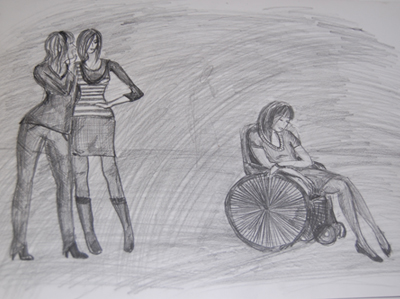Alina came to our class from another class in the school.
She was 13 and she had problems with her legs; she couldn’t
move them and moved around with a wheelchair.
Everybody became very quiet when she wheeled herself
into the room. Anna was in the back of the class whispering to
Tatiana, and they both laughed. I looked at them with as mean a
look as I could make. I helped the teacher bring books and
supplies to Alina.

At break, Anna came up to me and said, “Olga, Alina is a
cripple. We don't think it is cool for you to be friendly with her.”
Tatiana added, “Right, if no one is friendly to her, maybe
she will go back to her other class. We really don't want her in
our class.”
“This is unbelievable. What do you mean? Do you have a
right to disapprove of someone just because she is disabled. You
are the freaks.” I was angry. I imagined what it would feel like to
be in her place… Imagine no one wanting to be your friend, and
because it is something you can't change.
Get the Flash Player to see this player.
I would hate to be looked at with pity, or fright or even
disgust.
During the next class, I observed her for some time. She
was just like any of us: a pretty face, bright eyes, nice smile. She
laughed at the same jokes we did, she knew all the latest news in
politics, science, fashion and music. I decided that I wanted to
become friends with her.
Several years later she had surgery on her legs and now she
can walk, jump, run and enjoy her life. She also has lots of
friends, but still she says that I’m her best friend.
Now we can go swimming, even dancing together! I’m glad
that I was with her during that difficult period of her life. This
experience helped me to understand different people better.
I’m convinced that it doesn’t matter if a person has
disabilities or not. Appearance plays an important role in our life,
but it is not the main thing. The main thing is to be a good
person inside!
Exercises
I. Understanding the Story
Discuss this story's main idea with a partner.
II. Vocabulary
Match these words with a synonym/phrase on the right.
A. problems |
1. feel sorry for |
B. to wheel |
2. watch and look at |
C. cripple |
3. difficult things to solve |
D. disabled |
4. move around in a wheeled chair |
E. pity |
5. someone who walks differently |
F. disgust |
6. annoyance; extreme dislike |
G. observe |
7. not being able to do something |
III. Now you Talk
1. Retell the story, taking turns.
2. What would you have done if you had been Olga?
3. Describe another disability.
IV. Now you Write
1. Describe the two main characters.
2. Write an email from Tatiana to Anna.
3. Write a summary of the story.
V. Grammar Practice
Combine the two or three sentences into one. Example: She came
into the room. The students left. “When she came into the room,
the students left.”
1. She has lots of friends. I am still her best friend.
2. She had surgery. Now she can walk. She can dance too.
3. Anna said unkind things. Olga became angry.
4. I observed her. She laughed at the same jokes.
VI. Role Play
1. Alina and the writer: Their first conversation after class.
2. The writer and Anna: They disagree about Alina.
3. Anna and Tatiana: They discuss getting Alina out of the class.
4. The writer and the teacher: They talk about how to solve the
problem.
5. Alina and the writer (after the surgery): They plan what to do. |

